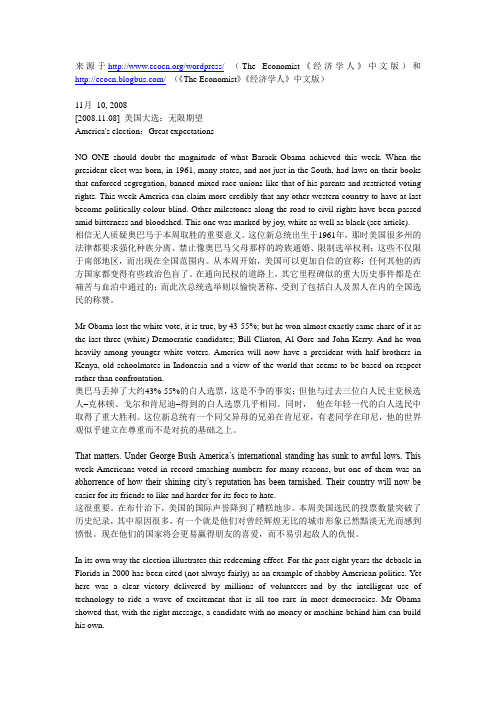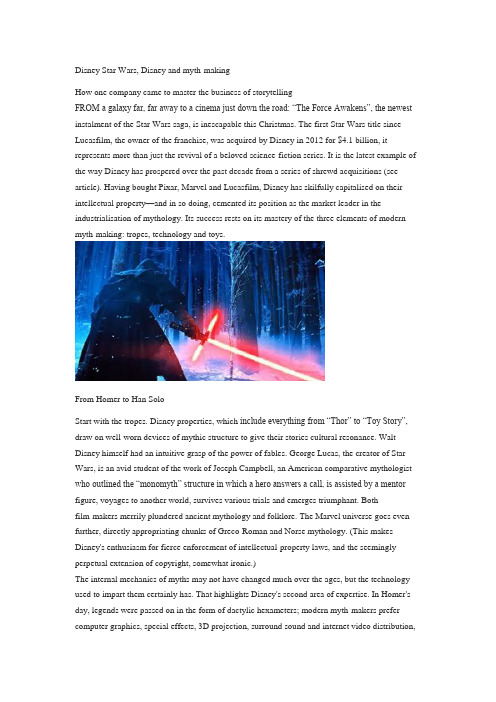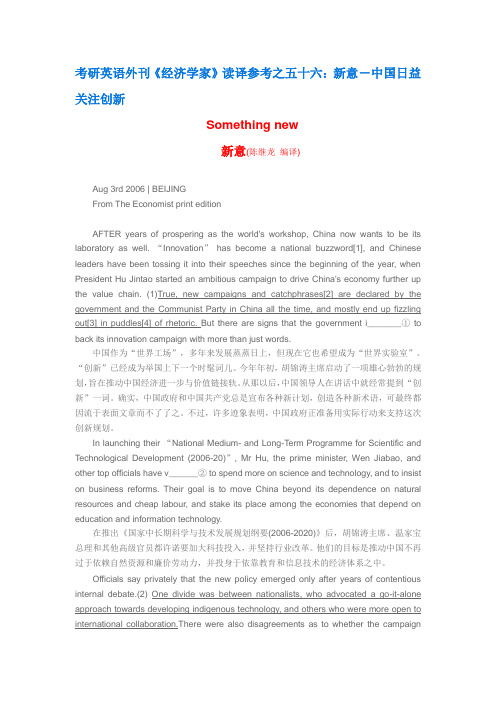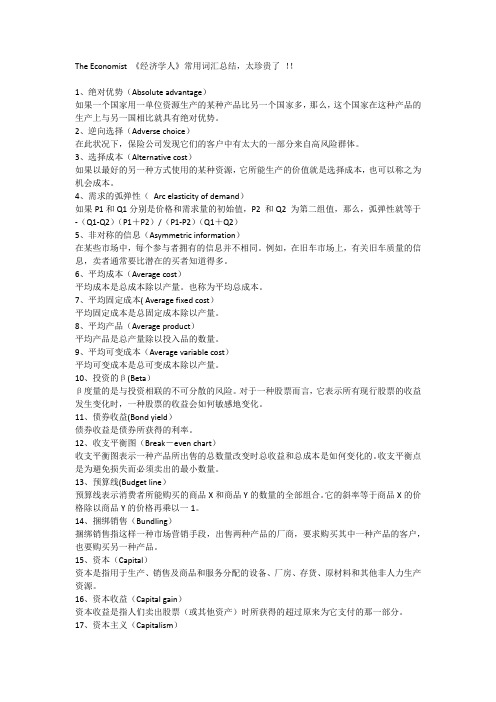经济学人 2014.10 封面文章 最新翻译
英语学习_(6-10)《经济学人》中英对照_必备

英语学习_(6-10)《经济学⼈》中英对照_必备弃我去者,昨⽇之⽇不可留乱我⼼者,今⽇之⽇多烦忧TEXT 6Travelling with baggage背着⾏囊去旅⾏Feb 16th 2006From The Economist print edition(1)FEW modern travel writers excite more hostility and awe than Sir ★Wilfred Thesiger[1], who died in 2003. Despising the “drab uniformity of the modern world”, Sir Wilfred ★slogged across [2] Africa and Asia, especially Arabia, on animals and on foot, immersing himself in tribal societies. He delighted in killing—lions in Sudan in the years before the second world war, Germans and Italians during it. He disliked “soft”living and “★intrusive[3]”women and revered murderous savages, to whom he gave guns. He thought educating the working classes a waste of good servants. He kicked his dog. His journeys were more notable as feats of ★masochistic[4] endurance than as exploration. Yet his first two books, “Arabian Sands”, about his crossing of the Empty Quarter, and “The Marsh Arabs”, about southern Iraq, have a ★terse[5] brilliance about them. As records of ancient cultures on the ★cusp[6] of ★oblivion[7], they are unrivalled.现代游记作家鲜有⼈能⽐2003年去世的威福瑞?塞西格爵⼠更令⼈敬畏。
《经济学人》英中对照翻译版(考研英语必备)

来源于/wordpress/(The Economist《经济学人》中文版)和/(《The Economist》《经济学人》中文版)11月10, 2008[2008.11.08] 美国大选:无限期望America's election:Great expectationsNO ONE should doubt the magnitude of what Barack Obama achieved this week. When the president-elect was born, in 1961, many states, and not just in the South, had laws on their books that enforced segregation, banned mixed-race unions like that of his parents and restricted voting rights. This week America can claim more credibly that any other western country to have at last become politically colour-blind. Other milestones along the road to civil rights have been passed amid bitterness and bloodshed. This one was marked by joy, white as well as black (see article).相信无人质疑奥巴马于本周取胜的重要意义。
这位新总统出生于1961年,那时美国很多州的法律都要求强化种族分离、禁止像奥巴马父母那样的跨族通婚、限制选举权利;这些不仅限于南部地区,而出现在全国范围内。
《经济学人》封面文章

荫译:皖东(新浪财经)《经济学人》封面文章:未来的希望投资最忌好高骛远、盲从热潮和短视近利。
———雪拜·戴维斯[美国]WISDOM ·VIEW ·外刊速览·责任编辑:赵迪E-mail:*****************第15期本期《经济学人》封面文章认为世上最大经济体美国已开始了亟需的经济转型。
奥巴马总统在这方面应能有更多作为。
经历了自上世纪30年代以来最严重衰退的美国经济,在去年收缩2.4%以后预计今年可增长3%。
分析师们还预测,美国就业形势最终在今年会改善。
与步入衰退时情形完全不同的是,高失业率、大量丧失抵押房屋赎回权和公共财政的巨大窟窿是走出衰退时仍存在的显著危险。
而消费、住房和负债与出口的关系,投资与储蓄的关系则构成经济中的隐形危险。
未来许多不确定性不仅要靠华府政治人物,而且还有赖于美国之外的政治家。
美国数十年来的增长一直依靠着消费者大量借款进行开支的意愿,资产价格泡沫支撑着虚假安逸。
住房价格崩溃掏空了消费者的财富,让他们现变得更节俭,并更少借款。
靠着消费文化发达起来的众多企业巨头正重新思考增长方式,同时也在收缩自己的借贷规模。
美国住房开发商现在开发的产品是规模更小、形式更简单的产品。
衰退让美国摒弃了贪大求全,追求奢靡的风潮。
诚然,代价更高的稀缺资金是一个原因,而能源不再像以往那般廉价也是影响未来的重要因素。
更多普通消费者选择节能车型,而开采深藏美国地下的石油已是利润丰厚的追求。
若照此趋势发展下去,美国2025年的石油进口可能不到5年前的一半。
随着国内消费者勒紧腰带,美国企业必会向海外出口更多商品。
有竞争力的美元和现有传统市场增长,会让已处在领先地位的象高附加值加工类的美国行业表现不俗。
这会带来更平衡的美国经济,同时也会让全球经济更健康。
但此转型的成功不会被认为是理所当然的。
美国内外的政策制定者们将决定调整究竟是以痛苦或轻松方式进行。
若美国人节俭换来世上其他一些大国的相反做法,世界会因此繁荣。
经济学人翻译 最新 2014 .10 Weaker than it looks纯净版

Weaker than it looks比看起来的虚弱美国和英国的经济离脱离险境还有很长一段路要走,但是这个似乎已经能瞥到尽头。
在九月,美国的失业率降到了6%一下。
而至于英国经济,上半年的出口已经增长了3.2个百分点,是所有发达国家中增长速度最快的。
中央银行的银行家们都在数离下次提息还有多少天。
事实上,到处的新闻都在播报令人沮丧的消息,或者是更沮丧的。
欧元区,作为世界上第二大的经济区域,看起来又从恢复中彻底地掉入了彻底的经济衰退,因为德国一不小心打了滑。
太过脆弱的工业生产和出口数值都意味着德国德国的GDP再接下去的第二个季度里即将面临再一次的缩水——这是一种通俗意义上的经济衰退. 日本作为世界上第三大的经济体,可能也在经济衰退的边缘,因为四月消费税的提高比预期更严重地影响了日本国内消费。
俄罗斯和巴西的经济仍然停滞,当然这是往好了说。
甚至在中国,竟然还能保持稳定的每年7.5%的增长率,中国国内也有很多的关于房地产泡沫, 信贷泡沫和生产力衰退的忧虑。
这样不均衡的世界经济是不会平稳发展的。
无论是安格鲁撒克逊世界之外的经济弱势被证实要么知识暂时现象,要么就是恐吓世界经济市场使未来变得灰暗。
传统的观点认为在2015年全球的增长势头才会强劲起来,因为美国经济对其他地区的支持和经济弱势被证明为只是暂时的。
(国际货币基金组织)IMF机构认为明年全球的经济将增长3.8%。
虽然,这份报纸在两个方面可能过于担心,第一,当今的经济衰退,尤其是欧元区,不会比专家们预计的持续得更久。
第二,不均衡的发展本身就可以刺激经济的动荡,尤其是针对美元。
Fearing the wurst 对于德国的恐惧对“德式香肠”的恐惧欧元区的情况远远比提要里提供的简单数字更糟糕,因为在很长的一段时间里(欧元区的经济)受到了德国的鼓舞. 意大利已经在两年里都处于经济衰退的情况,法国经济也好几个也停滞不前。
但是现在德国也陷入了麻烦,这种日式通货螺旋紧缩也加快了脚步。
经济学人两篇+翻译

Disney Star Wars, Disney and myth-makingHow one company came to master the business of storytellingFROM a galaxy far, far away to a cinema just down the road: “The Force Awakens”, the newest instalment of the Star Wars saga, is inescapable this Christmas. The first Star Wars title since Lucasfilm, the owner of the franchise, was acquired by Disney in 2012 for $4.1 billion, it represents more than just the revival of a beloved science-fiction series. It is the latest example of the way Disney has prospered over the past decade from a series of shrewd acquisitions (see article). Having bought Pixar, Marvel and Lucasfilm, Disney has skilfullycapitalised on their intellectual property—and in so doing, cemented its position as the market leader in the industrialisation of mythology. Its success rests on its mastery of the three elements of modern myth-making: tropes, technology and toys.From Homer to Han SoloStart with the tropes. Disney properties, which include everything from “Thor” to “Toy Story”, draw on well-worn devices of mythic structure to give their stories cultural resonance. Walt Disney himself had an intuitive grasp of the power of fables. George Lucas, the creator of Star Wars, is an avid student of the work of Joseph Campbell, an American comparative mythologist who outlined the “monomyth” structure in which a hero answers a call, is assisted by a mentor figure, voyages to another world, survives various trials and emerges triumphant. Bothfilm-makers merrily plundered ancient mythology and folklore. The Marvel universe goes even further, directly appropriating chunks of Greco-Roman and Norse mythology. (This makes Disney's enthusiasm for fierce enforcement of intellectual-property laws, and the seemingly perpetual extension of copyright, somewhat ironic.)The internal mechanics of myths may not have changed much over the ages, but the technology used to impart them certainly has. That highlights Disney's second area of expertise. In Homer's day, legends were passed on in the form of dactylic hexameters; modern myth-makers prefer computer graphics, special effects, 3D projection, surround sound and internet video distribution,among other things. When Disney bought Lucasfilm it did not just acquire the Star Wars franchise; it also gained Industrial Light & Magic, one of the best special-effects houses in the business, whose high-tech wizardry is as vital to Marvel's Avengers films as it is to the Star Wars epics. And when Disney was left behind by the shift to digital animation, it cannily revitalised its own film-making brand by buying Pixar, a firm as pioneering in its field as Walt Disney had been in hand-drawn animation. Moreover, modern myths come in multiple media formats. The Marvel and Star Wars fantasy universes are chronicled in interlocking films, television series, books, graphic novels and video games. Marvel's plans are mapped out until the mid-2020s.But these days myths are also expected to take physical form as toys, merchandise and theme-park rides. This is the third myth-making ingredient. Again, Walt Disney led the way, licensing Mickey Mouse and other characters starting in the 1930s, and opening the original Disneyland park in 1955. Mr Lucas took cinema-related merchandise into a new dimension, accepting a pay cut as director in return for all the merchandising rights to Star Wars—a deal that was to earn him billions. Those rights now belong to Disney, and it is making the most of them: sales of “The Force Awakens” merchandise, from toys to clothing, are expected to be worth up to $5 billion alone in the coming year. In all, more than $32 billion-worth of Star Wars merchandise has been sold since 1977, according to NPD Group, a market-research firm. Even Harry Potter and James Bond are scruffy-looking nerf-herders by comparison.Those other franchises are reminders that Disney's approach is not unique. Other studios are doing their best to imitate its approach. But Disney has some of the most valuable properties and exploits them to their fullest potential. It is particularly good at refreshing and repackaging its franchises to encourage adults to revisit their childhood favourites and, in the process, to introduce them to their own children. This was one reason why Pixar, whose films are known for their cross-generational appeal, was such a natural fit. Now the next generation is being introduced to Star Wars by their nostalgic parents. At the same time, Disney has extended its franchises by adding sub-brands that appeal to particular age groups: children's television series spun off from Star Wars, for example, or darker, more adult tales from the Marvel universe, such as the “Daredevil” and “Jessica Jones” series on.Do, or do not—there is no tryWhat explains the power of all this modern-day mythology? There is more to it than archetypal storytelling, clever technology and powerful marketing. In part, it may fill a void left by the decline of religion in a more secular world. But it also provides an expression for today's fears.T he original “Star Wars” film, in which a band of plucky rebels defeat a technological superpower, was a none-too-subtle inversion of the Vietnam war. The Marvel universe, originally a product of the cold-war era, has adapted well on screen to a post-9/11 world of surveillance and the conspiratorial mistrust of governments, large corporations and the power of technology. Inuncertain times, when governments and military might seem unable to keep people safe or stay honest, audiences take comfort in the idea of superheroes who ride to the rescue. Modern myths also have the power to unify people across generations, social groups and cultures, creating frameworks of shared references even as other forms of media consumption become ever more fragmented.Ultimately, however, these modern myths are so compelling because they tap primordial human urges—for refuge, redemption and harmony. In this respect they are like social-media platforms, which use technology to industrialise social interaction. Similarly, modern myth-making, reliant though it is on new tools and techniques, is really just pushing the same old buttons in stone-age brains. That is something that Walt Disney understood instinctively—and that the company he founded is now exploiting so proficiently.迪士尼星球大战,迪士尼和神话创造一个公司如何成为兜售故事的商业传奇从遥远的星际抵达你周边的电影院—《星球大战7:原力觉醒》这部星战系列的最新影片就在圣诞期间上映,不容错过。
经济学人中英文

考研英语外刊《经济学家》读译参考之五十六:新意-中国日益关注创新Something new新意(陈继龙编译)Aug 3rd 2006 | BEIJINGFrom The Economist print editionAFTER years of prospering as the world's workshop, China now wants to be its laboratory as well. “Innovation”has become a national buzzword[1], and Chinese leaders have been tossing it into their speeches since the beginning of the year, when President Hu Jintao started an ambitious campaign to drive China's economy further up the value chain. (1)True, new campaigns and catchphrases[2] are declared by the government and the Communist Party in China all the time, and mostly end up fizzling out[3] in puddles[4] of rhetoric. But there are signs that the government i_______①to back its innovation campaign with more than just words.中国作为“世界工场”,多年来发展蒸蒸日上,但现在它也希望成为“世界实验室”。
“创新”已经成为举国上下一个时髦词儿。
今年年初,胡锦涛主席启动了一项雄心勃勃的规划,旨在推动中国经济进一步与价值链接轨。
第62天:经济学人

高斋资料班: 每日一段100字左右外刊经济学人英译汉来源:高斋翻译Joy老师(微博@高斋翻硕)修订后的经济学人译文原文:Livestock is a big and growing business all over east Africa, in considerable part fuelled by the Gulf’s increasing appetite for meat. Live Sudanese animal exports more than trebled to $670m between 2010 and 2013 (the most recent years for which the World Bank has data) . More than 70% were sheep, demand for which surges around the Muslim festival of Eid al-Adha, when they are ceremonially slaughtered. In 2015 Somalia sold 5.3m animals, worth $384m; livestock counts for 40% of that fractured country’s GDP. Other Sudanese may sneer that the Rashaida’s new cars and houses have been bought with the proceeds of people-smuggling. But there is plenty of money to be made in the legitimate business of exporting livestock.微博@高斋翻硕高斋翻译Joy老师(微博@高斋翻硕)的修订后的译文:在整个东非地区,牲畜贸易都是大买卖,而且近年来发展迅速,很大程度上得益于海湾国家对肉类产品不断增长的需求。
经济学人最新中英对照

The Economist 《经济学人》常用词汇总结,太珍贵了!!1、绝对优势(Absolute advantage)如果一个国家用一单位资源生产的某种产品比另一个国家多,那么,这个国家在这种产品的生产上与另一国相比就具有绝对优势。
2、逆向选择(Adverse choice)在此状况下,保险公司发现它们的客户中有太大的一部分来自高风险群体。
3、选择成本(Alternative cost)如果以最好的另一种方式使用的某种资源,它所能生产的价值就是选择成本,也可以称之为机会成本。
4、需求的弧弹性(Arc elasticity of demand)如果P1和Q1分别是价格和需求量的初始值,P2 和Q2 为第二组值,那么,弧弹性就等于-(Q1-Q2)(P1+P2)/(P1-P2)(Q1+Q2)5、非对称的信息(Asymmetric information)在某些市场中,每个参与者拥有的信息并不相同。
例如,在旧车市场上,有关旧车质量的信息,卖者通常要比潜在的买者知道得多。
6、平均成本(Average cost)平均成本是总成本除以产量。
也称为平均总成本。
7、平均固定成本( Average fixed cost)平均固定成本是总固定成本除以产量。
8、平均产品(Average product)平均产品是总产量除以投入品的数量。
9、平均可变成本(Average variable cost)平均可变成本是总可变成本除以产量。
10、投资的β(Beta)β度量的是与投资相联的不可分散的风险。
对于一种股票而言,它表示所有现行股票的收益发生变化时,一种股票的收益会如何敏感地变化。
11、债券收益(Bond yield)债券收益是债券所获得的利率。
12、收支平衡图(Break-even chart)收支平衡图表示一种产品所出售的总数量改变时总收益和总成本是如何变化的。
收支平衡点是为避免损失而必须卖出的最小数量。
13、预算线(Budget line)预算线表示消费者所能购买的商品X和商品Y的数量的全部组合。
- 1、下载文档前请自行甄别文档内容的完整性,平台不提供额外的编辑、内容补充、找答案等附加服务。
- 2、"仅部分预览"的文档,不可在线预览部分如存在完整性等问题,可反馈申请退款(可完整预览的文档不适用该条件!)。
- 3、如文档侵犯您的权益,请联系客服反馈,我们会尽快为您处理(人工客服工作时间:9:00-18:30)。
申明:1.本文章仅是翻译,并非译者观点,也无需反驳或争辩。
2.本文仅做学习,或讨论翻译之用途,严禁用于其它用途!
3.其中一些略有冒犯的话译者都用原文代替,避免争论。
请见谅
同性恋的沟壑
在上个世纪70年代,亚利桑那州有一位男孩,他觉得与一位女性接触跟摸一台吐司机差不多。
但是他一直告诉自己他不是同性恋。
为了是自己变得所谓“正常”,他把自己对于肌肉男的迷恋归咎于对那些男性帅气外貌的嫉妒。
一直到他25岁,他才承认这样(自己是同性恋的)事实——更别说别人了(别人也没拆穿他)。
1996年,他给经济学人写了一篇封面文章,并为支持同性婚姻表达了自己的意愿。
他也没想到在他有生之年会发生这样的事。
现在,他已经和一位他所爱的男人结婚了,并生活在维吉尼亚州郊区,而且当地人们对这种事都习以为常。
在很多国家,人们对同性恋的态度都转变了,不仅在西方,更有拉丁美洲,中国等等。
这不得不说是世界上的一个奇迹。
这周,美国最高法庭驳回了几项反同性婚姻的质疑,无疑又给了同性婚姻很大的激励。
许多美国人生活的州都允许同性可以结婚。
但是仍然有五个国家执行处决同性的政策:Iran hangs them; Saudi Arabia stones them. 仍有78个国家认为同性恋不合法。
其中有些国家最近更是出台法律,这使同性恋者的生活更是灰暗。
不得不说同性恋才是世界上最深的分水岭。
是什么导致现在的情形?对同性恋的容忍最终是否会传遍全球呢?
两步一倒退
(关于同性恋)进步的速度是惊人地快。
在20世纪50年代,同性恋在全世界范围内还都是几乎不合法的。
在英国,内政大臣还发动了革命要铲除同性恋者,并派出便衣警察去往酒吧诱骗同性恋者并逮捕送往监狱。
在中国上个世纪80年代,homosexuals were rounded up and sent to labour camps without trial.总之世界各地的同性恋者都得活的鬼鬼祟祟,担惊受怕。
美国一些州的法律在2003之前也禁止同性性行为。
如今,同性行为已经在至少113个国家合法化。
同性婚姻和民事结合在36个和其他一些地区得到了承认。
如今,如果仍对公开对同性恋抱有厌恶情绪反倒是不被公众所认可接受的。
在中国,同性生活是合法的并且在城市中,更是坦率的。
拉丁美洲更是亲同性恋:74%的阿根廷人和60%的巴西人认为当今社会应该要接受同性恋关系。
泰国人比西方人对于变性人问题看得更开,南美宪章现在完全是支持同性恋的,而年轻群体现在更倾向赞同同性恋。
在南韩50岁以上的老年人中只有16%认为应该接受同性恋,但是在18-29岁的年轻人中,这个比例达到了71%。
但是现在在世界上一些地方,成为同性恋是一件不太安全的事。
Extra-judicial beatings and murders are depressingly common in much of Africa and in some Muslim countries. African gangs subject lesbians to “corrective rape”在一些国家,对同性恋的迫害愈演愈烈Chad is poised to ban gay sex. Nigeria and Uganda have passed draconian anti-gay laws (though a court recently struck Uganda's down).俄国和一些其他的国家也已经禁止了同性恋的扩散。
这都是他们在应对阻止西方同性恋权益传播的方法。
由于全球化的影响,生活在人人
都鄙夷同性恋地区的人们可以看到悉尼的同性恋权利游行或者是发生在马塞诸塞州两个男人结婚的照片。
他们认为这不可思议。
与此同时,一些反同性恋的西方牧师传教士鼓动非洲的反同性恋群众,同时美国的保守人士也向国家提供建议,希望立法部门起草反同性恋的法律。
对同性恋的厌恶之情来源已久,而且是深刻的,由衷的,即便是一些政治家强烈抵抗同性恋,那些只是为了人民的吁求。
普京和尼日利亚的乔纳森毫无疑问是希望对付一个想象中的传播性行为并以此来将注意力distract attention from the corruption and incompetence of their own regimes.,但是他们在选择替罪羊的时候太聪明了:因为74%的俄国人和98%的尼日利亚人都是不赞同同性恋的。
在一些国家,例如印度尼西亚,塞内加尔,乌干达和马来西亚等,青年人也没有比老年人对同性恋者更宽容,有时可能还比不上他们。
尽管如此,至少在长时间内还是有一些让人乐观的消息。
原因就是,城市化。
相较于一个在一个每个人都知道你的底细的村子里,身处在在一个偌大切匿名的城市中更容易找到一个栖身之地。
同性恋在印度农村的现状还是十分糟糕,但是在孟买和德里会轻松一点,尽管是不合法的。
现今,一半的南非人都说想要当个同性恋就去隔壁吧。
当人们都移居到城市中居住后,传统就会渐渐失去它们的约束力,而且到了2050年,现有的55%的城镇化预计会增长到66%。
在亚洲和拉丁美洲的新兴国家因为日益富裕,开明和明主,所以对日益庞大的同性恋群体更加宽容,当然也希望非洲和阿拉伯国家也可以同样。
虽然宗教是很大的一个阻碍原因-社会如果对宗教越加虔诚,他们对同性恋的态度就越冷淡- 这其实也不是一个不能克服的原因,很多笃信宗教的国家现在对于同性恋都是很宽容的,例如菲律宾和美国。
熟悉孕育容忍
怎么样才可以增加社会对同性恋的容忍度。
如果过去的半个世纪没有导向,那么先锋者就是同性恋他们自己。
他们越被大众熟知,他们就会被认为越正常。
如今有75%的美国人说自己有同性恋朋友或者同事,而在1985年,这个数字只有24%。
但是如果当地一个吃螃蟹的人,很有可能会面临牢狱之灾甚至更糟糕。
一些西方人可能想要借助援助款项作杠杆。
这可能在乌干达有作用,但是联系情况,这种方案经常失败。
但是减少援助可能又会给穷人带来伤害。
给当地的同性恋权益团体提供经济上的支持是很有用的,当他们收到不公时可以为他们的寻找到避风的港湾,让西方鼓动国外顽固分子的保守人士为自己感到羞耻。
对于那些一心想要人们可以对同性恋的态度有所好转的人来说,让他们相信这是不可能事件的确很困难。
毕竟,gay 或者lesbian 不是要求什么特殊的待遇,只是追求一种人人都习以为常的自由罢了,不过就是爱着他们愿意去爱的人,结着自己想要结婚的人。
